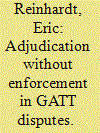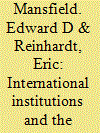| Srl | Item |
| 1 |
ID:
019517


|
|
|
|
|
| Publication |
April 2001.
|
| Description |
174-195
|
|
|
|
|
|
|
|
|
|
|
|
|
|
|
|
| 2 |
ID:
083127


|
|
|
|
|
| Publication |
2008.
|
| Summary/Abstract |
Do flexibility provisions in international agreements-clauses allowing for legal suspension of concessions without abrogating the treaty-promote cooperation? Recent work emphasizes that provisions for relaxing treaty commitments can ironically make states more likely to form agreements and make deeper concessions when doing so. This argument has particularly been applied to the global trade regime, the General Agreement on Tariffs and Trade (GATT) and its successor, the World Trade Organization (WTO). Yet the field has not produced much evidence bearing on this claim. Our article applies this claim to the global trade regime and its chief flexibility provision, antidumping. In contrast to prior work, this article explicitly models the endogeneity and selection processes envisioned by the theory. We find that states joining the WTO are more likely to adopt domestic antidumping mechanisms. Likewise, corrected for endogeneity, states able to take advantage of the regime's principal flexibility provision, by having a domestic antidumping mechanism in place, are significantly more likely to (1) join the WTO, (2) agree to more tightly binding tariff commitments, and (3) implement lower applied tariffs as well.
|
|
|
|
|
|
|
|
|
|
|
|
|
|
|
|
| 3 |
ID:
084825


|
|
|
|
|
| Publication |
2008.
|
| Summary/Abstract |
During the past half-century, states have established a large number of international trade institutions, both multilateral and regional in scope. The existing literature on this topic emphasizes that these agreements are chiefly designed to liberalize and increase the flow of overseas commerce. Yet such institutions have another function that has been largely ignored by researchers, namely, reducing volatility in trade policy and trade flows. Exposure to global markets increases the vulnerability of a country's output to terms of trade shocks. Governments seek to insulate their economies from such instability through membership in international trade institutions, particularly the World Trade Organization (WTO) and preferential trading arrangements (PTAs). We hypothesize that these institutions reduce the volatility of overseas commerce. We further hypothesize that, because market actors prefer price stability, trade institutions increase the volume of foreign commerce by reducing trade variability. This article conducts the first large-scale, multivariate statistical tests of these two hypotheses, using annual data on exports for all pairs of countries from 1951 through 2001. The tests provide strong support for our arguments. PTAs and the WTO regime significantly reduce export volatility. In so doing, these institutions also increase export levels.
|
|
|
|
|
|
|
|
|
|
|
|
|
|
|
|